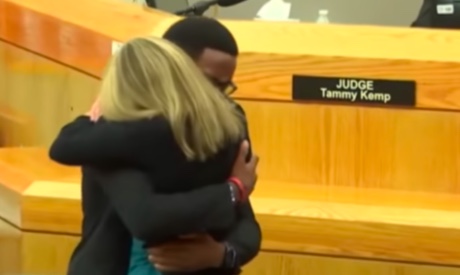On October 2, former Dallas police officer Amber Guyger was convicted of murdering Botham Jean in his own home.
Guyger claims she entered Jean’s apartment by accident (she lived on the floor above) and, mistaking him for a burglar, shot him dead. Jean was eating a bowl of ice cream.
Following Guyger’s sentencing, Jean’s 18-year-old brother Brandt embraced Guyger.
“I forgive you,” he told her; “I love you as a person, and I don’t wish anything bad on you.”
Most of us would call this a model act of mercy.
Yet, astonishingly, many Americans quickly took to social media expressing their disapproval of Brandt.
One newspaper columnist called it a “disappointing display of yet another person of color too ready to absolve a white person who harmed them.”
Apparently, forgiveness is no longer a virtue in this country.
In the case of Guyger and the Jeans, there are complicating factors.
Guyger, a white woman, was sentenced to ten years in prison for sneaking into the home of an unarmed black man and killing him.
Many believe her sentence to be unacceptably light.
“I think this whole act of forgiveness has gotten black people where they are in this country right now,” Ryan Williams, a black man, told The Washington Post.
African American historian Jemar Tisby similarly argued that “black people, when they experience injustice, there’s almost an expectation that we will immediately forgive and therefore can sort of move on.”
Not so, says Tisby: “We have a right to be angry, a right to grieve, and a right to want justice.”
This rising reticence about forgiveness goes beyond racial politics.
We as a nation are rapidly dispensing with forgiveness. In its stead, we favor resentment, vengeance, and even hatred.
Recently, television personality Ellen DeGeneres was castigated by left-wing celebrities and activists for sitting next to former president George W. Bush at a Dallas Cowboys game.
As one of the first celebrities in Hollywood to “come out” as same-sex attracted, Degeneres has long been a progressive icon.
Yet even that didn’t get her a free pass.
Actor Mark Ruffalo of Spotlightfame tweeted: “Sorry, until George W. Bush is brought to justice for the crimes of the Iraq War, (including American-lead [sic] torture, Iraqi deaths & displacement, and the deep scars—emotional & otherwise—inflicted on our military that served his folly), we can’t even begin to talk about kindness.”
Meanwhile, our current cultural distemper is one in which any celebrity or politician, dead or alive, risks having some comment or action revisited for public censure—the so-called “cancel culture.”
Black comedian Kevin Hart was pressured to step down from hosting the Oscars because of a 10-year-old tweet that disparaged homosexuality.
Heisman Trophy winner Kyler Murray was publicly censured for several homophobic tweets he wrote when he was 15 years old.
And, of course, we can’t forget the rapid return of that ancient Roman practice, damnatio memoriae—the “condemnation of memory,” where any figure in American history found to have violated modern standards of political correctness may be unceremoniously purged from public memory.
We as a nation are rapidly dispensing with forgiveness.
In its stead, we favor resentment, vengeance, and even hatred.
This cultivation of animosity is a thoroughly un-American trait, and one that seriously threatens the Christian foundations of our republic.
Christ himself, more than anyone else in human history, had a right to bitterness and revenge.
His own people betrayed him to an oppressive foreign regime, who then visited the full force of government-sanctioned violence upon him.
Mocked, scourged, stripped, and crucified, this sorrowful servant refused to indulge in hate.
Rather, as he asphyxiated on the Cross, he gasped those unforgettable words: “Father, forgive them, for they know not what they do.” Continue reading
- Image: YouTube/KENS 5
